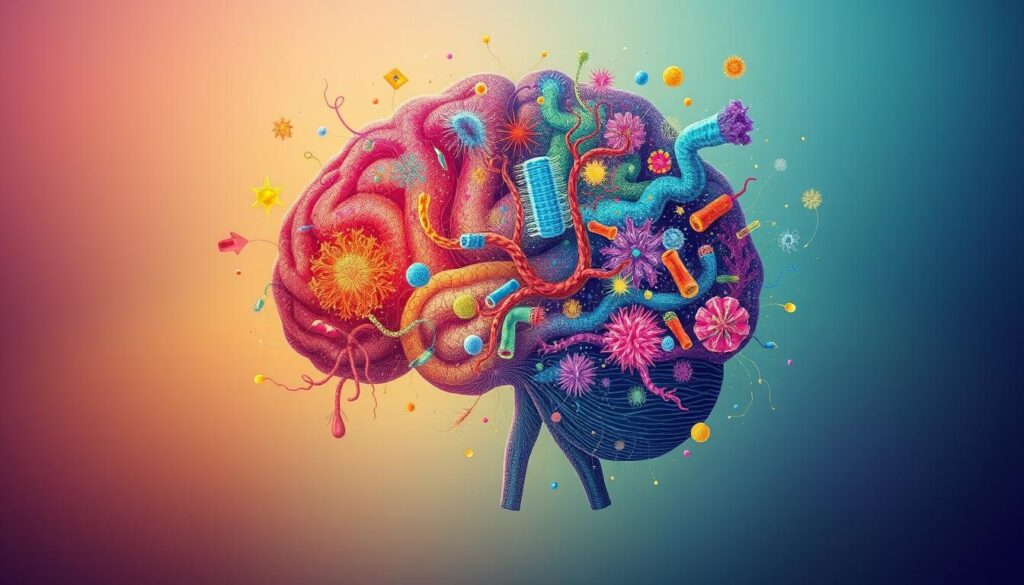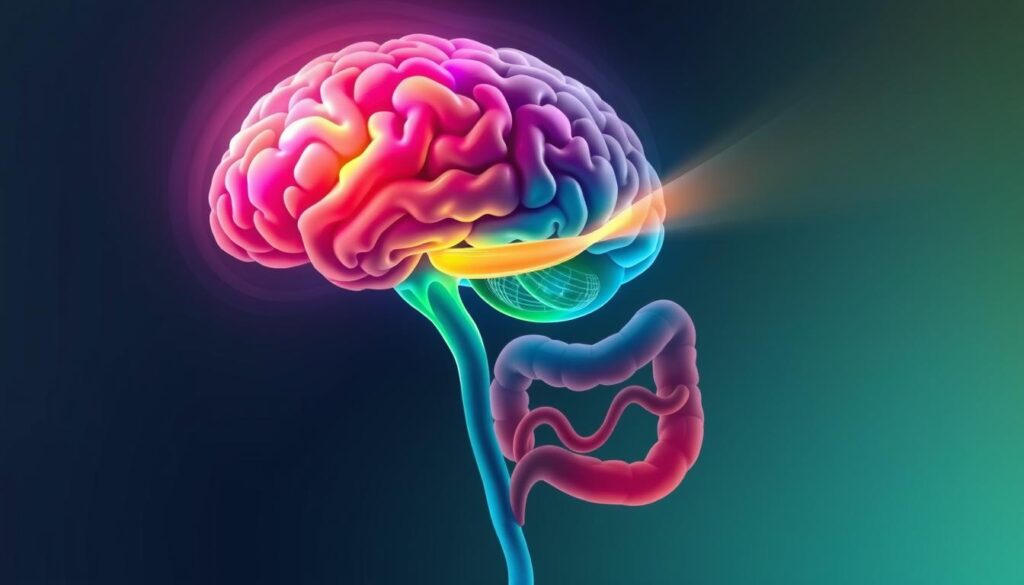Ever had a gut feeling that guided your choices? This connection between our mind and gut is real. It’s not just a saying. Our brain and digestive system known as the second brain greatly affect our health and mood.
But how does this mind gut link work? And what does it mean for our feelings and thinking?
Key Takeaways
- The enteric nervous system ENS with over 100 million neurons, is often referred to as the second brain due to its complex influence on digestion and mood regulation.
- Research suggests a strong bidirectional communication between the gut and the brain, with signals traveling both ways and impacting various aspects of health and wellness.
- Functional gastrointestinal disorders, such as irritable bowel syndrome IBS have been found to overlap significantly with mental health conditions like anxiety and depression.
- The gut microbiome, the diverse community of microorganisms living in the digestive tract, may play a role in neurological, mental health, and functional gastrointestinal disorders.
- Strategies to improve gut health, such as dietary changes and probiotic supplementation, are being explored as potential treatments for certain mental health conditions.
Understanding the Second Brain The Enteric Nervous System
Underneath our digestive system, there’s a complex network called the enteric nervous system ENS. It’s often called the second brain. This system has over 100 million nerve cells in our gut, from the esophagus to the rectum.
What is the Enteric Nervous System?
The ENS is a nervous system in our gut that works on its own. It handles important tasks like swallowing and absorbing nutrients. Even though it’s not as smart as our brain, it helps our mood and health.
How the ENS Functions Independently
The ENS works by itself, controlling digestion without the brain’s help. It has a network of neurons and cells that manage food movement and hormone release. This lets the gut work well on its own.
The Role of 100 Million Nerve Cells
The ENS has about 100 million nerve cells, more than the spinal cord. This huge number lets the gut talk to the brain through the vagus nerve. It helps keep our body balanced.

The gut is our second brain, and its health is crucial to our overall well-being.
Research is showing how important the gut brain connection is. By learning about the ENS we can improve our gut health. This leads to better physical and mental health.
The Mind Gut Connection How It Affects Your Overall Wellbeing
The mind and gut are closely linked, affecting our wellbeing deeply. This connection influences our mental health, how we process food, and our immune system.
The gut microbiome, a mix of microorganisms in our gut, is key to this link. These microbes make chemicals that impact our brain, mood, and thinking. An imbalance in the gut microbiome can raise the risk of anxiety and depression.
The gut is often referred to as the second brain due to the complex network of neurons and neurotransmitters it contains, which can significantly impact our mental health and overall wellbeing.
Improving gut health can help our mental state. For instance, cognitive-behavioral treatments, hypnotherapy, and mindfulness based therapies can help manage IBS by focusing on the mind-gut link.
On the other hand, mental health issues can harm our gut. Stress, anxiety, and depression can upset the gut’s balance causing digestive problems and worsening mental health. This shows why we need to care for both our body and mind.

Exploring the mind-gut connection opens up new ways to boost our health. From changing what we eat to specific therapies, this area is getting a lot of research and interest.
The Vagus Nerve The Communication Highway Between Gut and Brain
The vagus nerve is key in linking the gut and brain. It sends and receives messages between them. This helps keep our digestive system healthy and boosts our overall well-being.
Vagal Reflexes and Their Impact
The vagus nerve controls many reflexes. These reflexes help our body digest food and keep everything balanced. They respond to changes in the gut and food presence.
The gut brain axis lets the brain know what’s happening in the gut. This helps control how food moves through our body and keeps our immune system strong. It’s vital for our digestive and mental health.
Signal Transmission Mechanisms
The vagus nerve talks to the gut through different ways. The enteric nervous system, with its many neurons, is a key player. It detects changes in the gut and sends signals to the brain.
The gut microbiome also affects these signals. Changes in the gut’s bacteria can influence our mood and mental health. This shows how important the gut-brain axis is for our mental state.

The vagus nerve is responsible for regulating a variety of bodily functions, including mood, immune response, digestion, and heart rate.
Understanding how the gut and brain connect through the vagus nerve is key. It helps us find new ways to treat health issues. This includes problems with digestion and mental health.
Gut Microbiome’s Role in Mental Health
The gut microbiome is filled with trillions of microorganisms. These microbes help make neurotransmitters that talk to the brain and gut. Studies show that an imbalance in these microbes can lead to mental health issues like anxiety and depression.
The human gut has more bacteria than human cells. For every human gene, there are over 100 bacterial genes. People with mental health problems often have different gut bacteria.
Changes in diet can quickly change the gut microbiome. This is seen in people who eat more plants versus meat.
| Disorder | Microbiome Changes |
|---|---|
| Depression | Decrease in Dialister and Coprococcus spp. increase in Firmicutes, Prevotella, and Klebsiella |
| Bipolar Disorder | Increase in Clostridiaceae, Collinsella, and Flavonifractor |
| Schizophrenia | Decrease in Acetanaerobacterium, Haemophilus, and Turicibacter, increase in Lactobacillus fermentum, Enterococcus faecium, and Alkaliphilus oremlandii |
| Autism Spectrum Disorder | Increase in Clostridium bolteae |
| Anorexia Nervosa | Increase in Erysipelatoclostridium ramosum and Enterocloster bolteae |
| Posttraumatic Stress Disorder | Increase in Bacteroides |
The gut microbiome has a huge genome, much bigger than human DNA. It makes neuroactive metabolites that affect brain function and mental health. Studying this relationship could lead to new ways to improve well-being.
How Digestive Health Influences Mood and Emotions
The link between our gut and brain is clear. Our digestive health affects our mood and emotions. The gut is called the second brain because it has many neurons and can control our body’s functions.
Serotonin Production in the Gut
The gut makes about 95% of our serotonin. Serotonin helps control our mood, sleep, and hunger. If our gut microbiota is off, it can lead to anxiety and depression.
Impact on Anxiety and Depression
People with gut problems like IBS and ulcerative colitis often feel anxious or depressed. This shows how important gut health is for our mental state. Keeping a healthy mind gut and health gut is key for mental health.
Stress Response and Gut Function
Stress affects our gut and brain. Chronic stress can harm our gut-brain connection. This can hurt our mental and physical health. Managing stress and keeping our gut healthy can help.
Up to 80% of immune cells reside in the gastrointestinal tract, highlighting the significant role of the gut in immune function.
It’s vital to keep our mind gut, health gut, and mental health in balance. By understanding how our digestive health and emotions are connected, we can improve our overall well-being.

The Link Between Gastrointestinal Disorders and Mental Health Conditions
Research shows a clear link between GI disorders and mental health issues. Studies found that 30% to 40% of people with IBS also have depression and anxiety. Mental health problems can make GI symptoms worse, showing a two-way relationship between the brain and gut.
IBS and ulcerative colitis are linked to higher mental health disorder rates. This is due to the complex communication between the gut’s second brain and the main brain. Problems in this connection can cause both physical and mental symptoms.
Therapies like DBT and CBT can help both mental and GI health. Also, changing diets, managing stress, and using probiotics can benefit both areas. This shows how treating the mind and gut together can lead to better health.
Knowing how the gut and brain are connected helps in treating these conditions better. Healthcare providers can now tackle both GI and mental health issues together. This approach can lead to better treatment plans and outcomes for patients.
| Gastrointestinal Disorders | Associated Mental Health Conditions |
|---|---|
| Irritable Bowel Syndrome IBS | Anxiety Depression |
| Ulcerative Colitis | Anxiety Depression |
| Gastroesophageal Reflux Disease GERD | Anxiety Depression |
| Chronic Constipation | Anxiety Depression ADHD |
Healthcare professionals now understand the strong bond between the brain and gut. They can create better treatment plans that cover both physical and mental health. This approach aims to improve patients’ overall well-being.
Improving Mental Health Through Gut Health Management
The link between our gut and mind is clear. Keeping our gut healthy boosts our mental well-being. By eating right and using probiotics, we can care for our gut-brain connection. This helps our mental health and overall wellness.
Dietary Strategies for Better Gut Health
Eating a wide range of foods is key for a healthy gut. Fruits, veggies, whole grains, and fermented foods are great. They give us fiber, omega-3s, and nutrients for our gut.
Beans, legumes, oats, nuts, dark chocolate, and fatty fish are especially good. They help our gut and mind stay healthy.
Probiotics and Mental Wellness
Probiotics are live bacteria and yeasts that keep our gut healthy. They also support our mental health. Foods like yogurt, kefir, and kimchi are full of probiotics.
These foods can help balance our gut microbiome. This might lower anxiety and depression symptoms. Adding these foods to our diet can improve our mental wellness.
Changing our diet is just one part of the solution. Reducing stress and exercising regularly also help our gut-brain connection. Always talk to a healthcare provider before making big changes to your diet or adding supplements.
A healthy gut is the foundation for a healthy mind. By nourishing our gut, we can unlock the full potential of the mind-gut connection and cultivate a state of overall well-being.
Understanding the Brain Gut Axis in Disease Prevention
The brain-gut axis is key in preventing diseases. It connects our gut and brain health, helping us avoid many illnesses. Studies show that a healthy brain gut and health gut can lower risks of type 2 diabetes, obesity, and some brain disorders.
The gut microbiome is a big part of this connection. Our gut has about 100 billion neurons, called the second brain. This network, the enteric nervous system ENS, works with our main brain to control digestion, immune response, and mood.
- Probiotics, good gut bacteria, are vital for brain health. They help make GABA in the gut, which controls fear and anxiety. This can lead to less anxiety and depression.
- Short-chain fatty acids SCFA from gut microbes are important for brain function. They help control appetite and mood, and support the blood-brain barrier.
- Gut microbes also change bile acids and amino acids into chemicals that affect the brain. Stress and social issues can harm bile acid production, affecting brain genes.
To keep a healthy brain gut, eat well, manage stress, sleep enough, and avoid harmful substances. Understanding the brain health and health gut link helps us stay well.
By changing gut bacteria through diet, we can boost brain health. This shows how food affects our gut-brain axis and overall health.
Conclusion
The mind-gut connection is key to our health and wellness. It links the enteric nervous system, vagus nerve, gut microbiome, and brain. This connection affects both our gut and mental health.
By learning about the gut-brain axis, we can find better treatments for many diseases. This includes depression, anxiety, and Parkinson’s disease. It’s a big step forward in healthcare.
Improving gut health can boost our mental well-being. Eating right, managing stress, and changing our lifestyle can help. These actions can make our lives better.
Research keeps showing how the mind and gut talk to each other. This knowledge helps us see healthcare in a new light. It’s about treating the whole person, not just parts.
Understanding the mind-gut connection is growing. It shows that a healthy gut is vital for our mental and physical health. By living a gut-friendly life, we can be healthier and happier.





